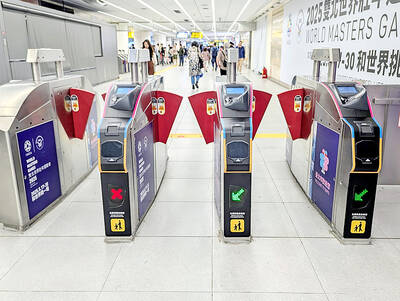The Asia-Pacific Music Collective Management Association (ACMA) has updated its licensing rates for karaoke machines used at KTVs, which would increase the payments for operators.
Licensing fees for for-profit karaoke machines at restaurants would increase to NT$1,000 (US$30.51), those for public entertainment, such as community classes, are to rise to NT$700, while they are to be NT$350 for activity centers.
Holiday Entertainment has about 1,900 karaoke rooms nationwide, so it faces an additional NT$5 million in licensing fees under the new rates, which were announced in December last year.

Photo: Chiu-Shao-wen, Taipei Times
The changes have been met with discontent from KTV operators such as Holiday Entertainment and Cashbox Partyworld Co, as well as the Chinese Music Song and Lyrics Broadcast Association, which have jointly filed a petition with the Intellectual Property Office to review the hikes, sources said yesterday.
It is not the first time KTV operators have protested rate hikes by the association, but provisions of the Copyright Collective Management Organization Act (著作權集管團體條例) show that it can set the licensing rates of intellectual property that it oversees and manages.
Songwriters commonly use collective management organizations to manage their works. The organizations, after licensing the right to use the songs, pay the creators royalties from the proceeds.
The act says that such entities must uphold the rights of public broadcast, public transmission and public performance, with KTV operators required to get licensing rights from them.
The Intellectual Property Office yesterday said that it is obligated to review the issue and decide within four months.
During the review, both sides would be asked to provide further documents as needed, such as KTV song lists and how often songs are used, the office said, adding that delays in providing documents would drag out the review.

A magnitude 6.4 earthquake struck off the coast of Hualien County in eastern Taiwan at 7pm yesterday, the Central Weather Administration (CWA) said. The epicenter of the temblor was at sea, about 69.9km south of Hualien County Hall, at a depth of 30.9km, it said. There were no immediate reports of damage resulting from the quake. The earthquake’s intensity, which gauges the actual effect of a temblor, was highest in Taitung County’s Changbin Township (長濱), where it measured 5 on Taiwan’s seven-tier intensity scale. The quake also measured an intensity of 4 in Hualien, Nantou, Chiayi, Yunlin, Changhua and Miaoli counties, as well as

Credit departments of farmers’ and fishers’ associations blocked a total of more than NT$180 million (US$6.01 million) from being lost to scams last year, National Police Agency (NPA) data showed. The Agricultural Finance Agency (AFA) said last week that staff of farmers’ and fishers’ associations’ credit departments are required to implement fraud prevention measures when they serve clients at the counter. They would ask clients about personal financial management activities whenever they suspect there might be a fraud situation, and would immediately report the incident to local authorities, which would send police officers to the site to help, it said. NPA data showed

ENERGY RESILIENCE: Although Alaska is open for investments, Taiwan is sourcing its gas from the Middle East, and the sea routes carry risks, Ho Cheng-hui said US government officials’ high-profile reception of a Taiwanese representative at the Alaska Sustainable Energy Conference indicated the emergence of an Indo-Pacific energy resilience alliance, an academic said. Presidential Office Secretary-General Pan Men-an (潘孟安) attended the conference in Alaska on Thursday last week at the invitation of the US government. Pan visited oil and gas facilities with senior US officials, including US Secretary of the Interior Doug Burgum, US Secretary of Energy Chris Wright, Alaska Governor Mike Dunleavy and US Senator Daniel Sullivan. Pan attending the conference on behalf of President William Lai (賴清德) shows a significant elevation in diplomatic representation,

The Taipei MRT is to begin accepting mobile payment services in the fall, Taipei Rapid Transit Corp said on Saturday. When the company finishes the installation of new payment units at ticketing gates in October, MRT passengers can use credit cards, Apple Pay, Google Pay and Samsung Pay, the operator said. In addition, the MRT would also provide QR payment codes — which would be compatible with Line Pay, Jkopay, iPass Money, PXPay Plus, EasyWallet, iCash Pay, Taiwan Pay and Taishin Pay — to access the railway system. Currently, passengers can access the Taipei MRT by buying a single-journey token or using EasyCard,